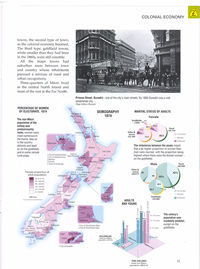NZHistory.net / Gallery / An Emerging Identity / Plate 4: The
Colony in 1874
The Colony in 1874
Thumbnails of the pages (click to see more detail):
Associated quiz from the Teachers'
Activities Workbook:
The answers to these questions can be found on the plate 'The Colony in 1874'.
This activity could be used as the basis for a class quiz. The class could be
divided into teams and given a set amount of time to find the answers. (Note
for the web version we have included the specific questions which relate to
each page with the detailed versions of the graphs and maps)
- Which centres had a female proportion of the adult population of between
50 and 51% in 1874?
- What did many of the areas that had a female proportion of the adult population
of below 20% have in common?
- What proportion of women living on the goldfields were married?
- What proportion of men living on the goldfields were married?
- Were there proportionately more widowers or widows?
- Why might widows live in the towns rather than on the goldfields?
- How many non-Maori people live in areas classified as 'rural' in 1874?
- What percentage of the total population was officially 'urban' in 1874?
- What percentage of the total population was estimated to be Maori in 1874?
- Which two provinces had the highest proportion of Australian-born residents
in 1874?
- Suggest why the two provinces referred to in question 10 might have had
a high proportion of Australian-born residents in 1874?
- Which province had the highest proportion of New Zealand-born residents
in 1874?
- What proportion of the people living in Wellington in 1874 were not born
in New Zealand?
- What proportion of Canterbury residents in 1874 were born in Britain?
- Which non-New Zealand-born group appears to have dominated the Otago province
in 1874?
[Related exhibition on this site: A
Home Away from 'Home': British and Irish Immigration to New Zealand, 1840–1914
]
Back to top



